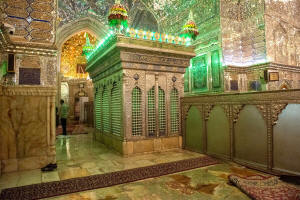Iran's Khamenei vows revenge after deadly attack on shrine
 Send a link to a friend
Send a link to a friend
 [October 27, 2022]
DUBAI (Reuters) - Iran's
supreme Leader vowed on Thursday to retaliate against those threatening
the country's security after the massacre of Shi'ite pilgrims, an
assault claimed by Islamic State which threatens to inflame tensions
amid widespread anti-government protests. [October 27, 2022]
DUBAI (Reuters) - Iran's
supreme Leader vowed on Thursday to retaliate against those threatening
the country's security after the massacre of Shi'ite pilgrims, an
assault claimed by Islamic State which threatens to inflame tensions
amid widespread anti-government protests.
In a statement read on state TV, Ayatollah Ali Khamenei said the
assailants "will surely be punished" and called on Iranians to unite.
"We all have a duty to deal with the enemy and its traitorous or
ignorant agents," said Khamenei a day after the attack killed 15 people.
Khamenei's call for unity appeared to be directed at mostly government
loyalists and not protesters whose nearly six-week old movement is seen
as a threat to national security by authorities.
Iran's clerical rulers have faced nationwide protests since the death in
police custody of Mahsa Amini, a 22-year-old Kurdish woman, on Sept. 16.
Iranians have called for the death of Khamenei and an end to the Islamic
Republic during the protests, which have become one of the boldest
challenges to the clerical leadership since the 1979 revolution, drawing
many Iranians on to the streets.

Iranian officials said they had arrested a gunman who carried out the
attack at the Shah Cheragh shrine in the city of Shiraz. State media
blamed "takfiri terrorists" - a label Tehran uses for hardline Sunni
Muslim militants such as Islamic State.
A senior official said the suspected attacker was in critical condition
after being shot by police.
"The shrine terrorist is in critical condition... and we have not been
able to interrogate him yet," said deputy provincial governor Easmail
Mohebipour, quoted by the semi-official Tasnim news agency.
CCTV footage broadcast on state TV on Thursday showed the attacker
entering the shrine after hiding an assault rifle in a bag and shooting
as worshippers tried to flee and hide in corridors.
[to top of second column]
|

A general view of the Shah Cheragh
Shrine after an attack in Shiraz, Iran October 26, 2022. Amin
Berenjkar/WANA (West Asia News Agency) via REUTERS

Islamic State, which once posed a security threat across the Middle
East, has claimed previous violence in Iran, including deadly twin
attacks in 2017 that targeted parliament and the tomb of the Islamic
Republic's founder, Ayatollah Ruhollah Khomeini.
Since the peak of its power, when it ruled millions of people in the
Middle East and struck fear across the world with deadly bombings
and shootings, Islamic State has slipped back into the shadows.
Iran often accuses the West and its regional rivals Israel and Saudi
Arabia of fomenting attacks. Saudi Arabia denies this and Israel
usually declines to comment on its moves against the Islamic
Republic.
Wednesday's killing of Shi'ite pilgrims came on the same day that
Iranian security forces clashed with increasingly strident
protesters marking 40 days since Amini's death.
Iranian human rights groups said there were unconfirmed reports that
some members of Amini's family are under house arrest. Reuters could
not verify these reports. Reuters tried to reach Amini's father and
brother.
The authorities, who have accused the United States and other
Western countries of fomenting what they call "riots", have yet to
declare a death toll, but state media have said about 30 members of
the security forces have been killed.
The activist news agency HRANA said in a posting that at least 252
protesters had been killed in the unrest, including 36 minors.
It said 30 members of the security forces were killed and more than
13,800 people had been arrested as of Wednesday in protests in 122
cities and towns and some 109 universities.
(Reporting by Dubai newsroom; Writing by Michael Georgy; Editing by
Clarence Fernandez and Nick Macfie)
[© 2022 Thomson Reuters. All rights
reserved.]
This material may not be published,
broadcast, rewritten or redistributed.
Thompson Reuters is solely responsible for this content. |